Developing Effective Writing and Problem-Solving Skills
VerifiedAdded on 2020/01/15
|13
|4176
|176
AI Summary
This assignment delves into the significance of writing and problem-solving skills in various contexts. It examines theoretical frameworks, practical strategies, and resources for enhancing both abilities. The assignment encourages students to reflect on their own strengths and weaknesses in these areas and develop personalized action plans for improvement. It emphasizes the interconnectedness of effective communication, critical thinking, and solution-oriented approaches.
Contribute Materials
Your contribution can guide someone’s learning journey. Share your
documents today.
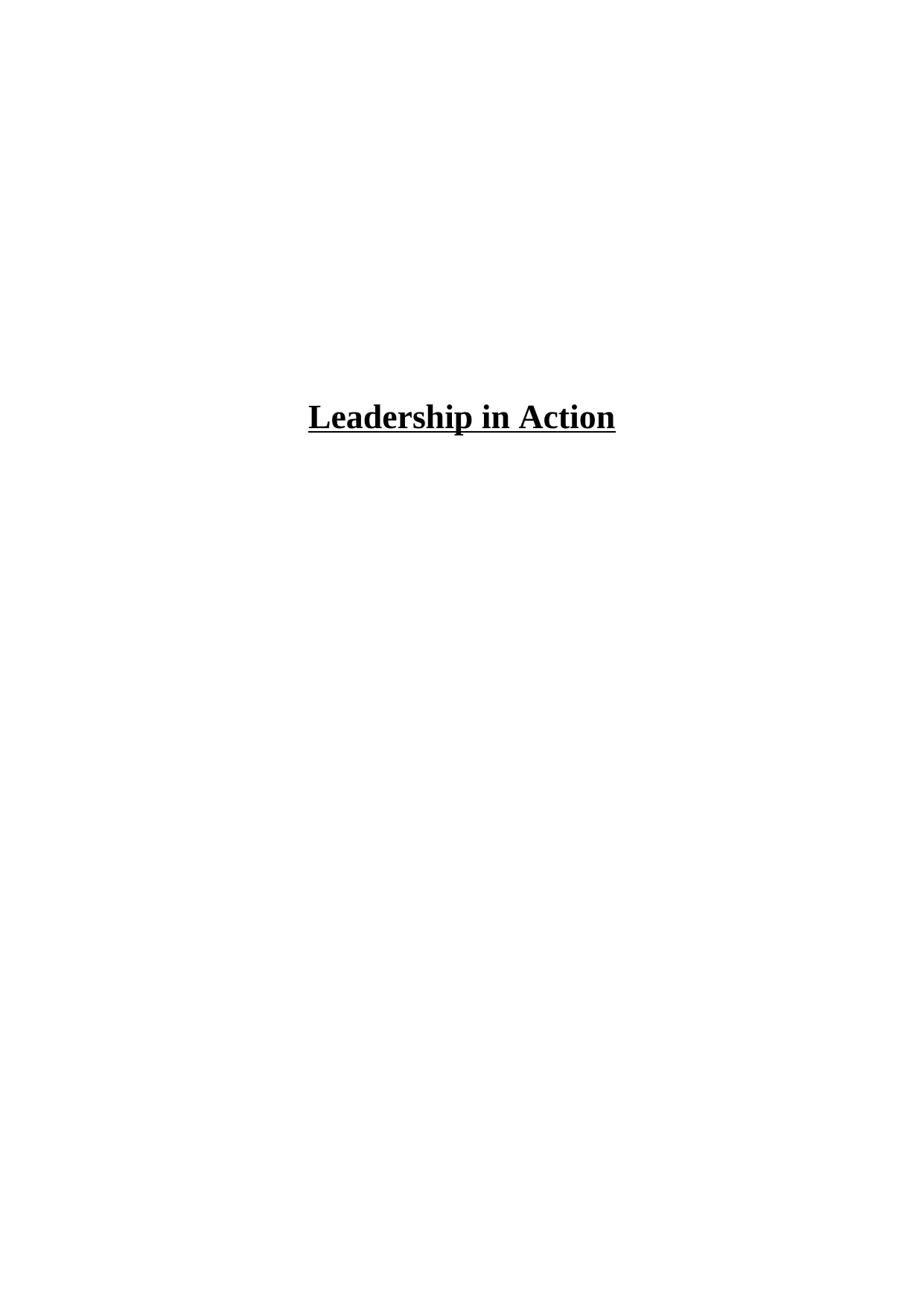
Leadership in Action
Secure Best Marks with AI Grader
Need help grading? Try our AI Grader for instant feedback on your assignments.
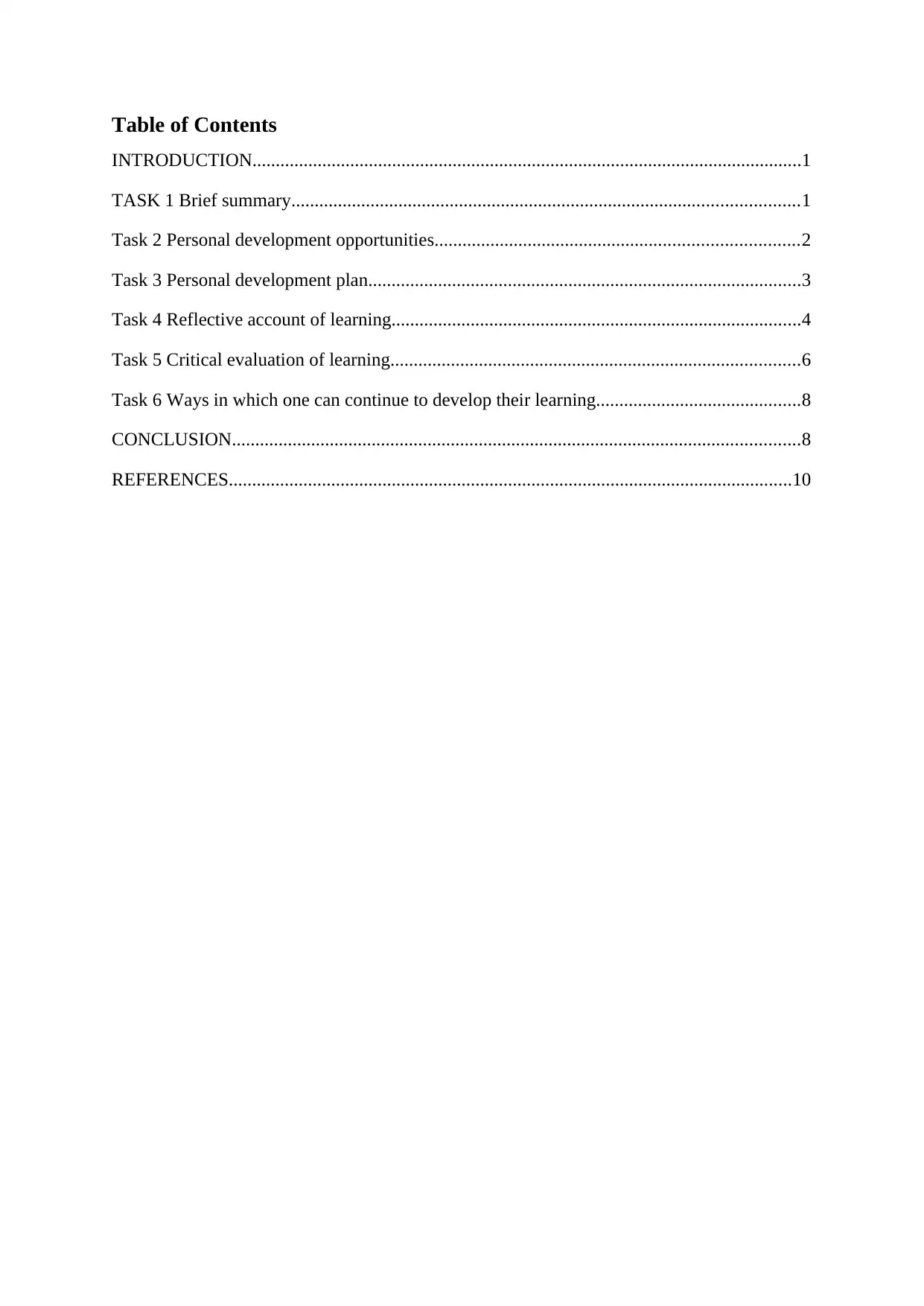
Table of Contents
INTRODUCTION......................................................................................................................1
TASK 1 Brief summary.............................................................................................................1
Task 2 Personal development opportunities..............................................................................2
Task 3 Personal development plan.............................................................................................3
Task 4 Reflective account of learning........................................................................................4
Task 5 Critical evaluation of learning........................................................................................6
Task 6 Ways in which one can continue to develop their learning............................................8
CONCLUSION..........................................................................................................................8
REFERENCES.........................................................................................................................10
INTRODUCTION......................................................................................................................1
TASK 1 Brief summary.............................................................................................................1
Task 2 Personal development opportunities..............................................................................2
Task 3 Personal development plan.............................................................................................3
Task 4 Reflective account of learning........................................................................................4
Task 5 Critical evaluation of learning........................................................................................6
Task 6 Ways in which one can continue to develop their learning............................................8
CONCLUSION..........................................................................................................................8
REFERENCES.........................................................................................................................10
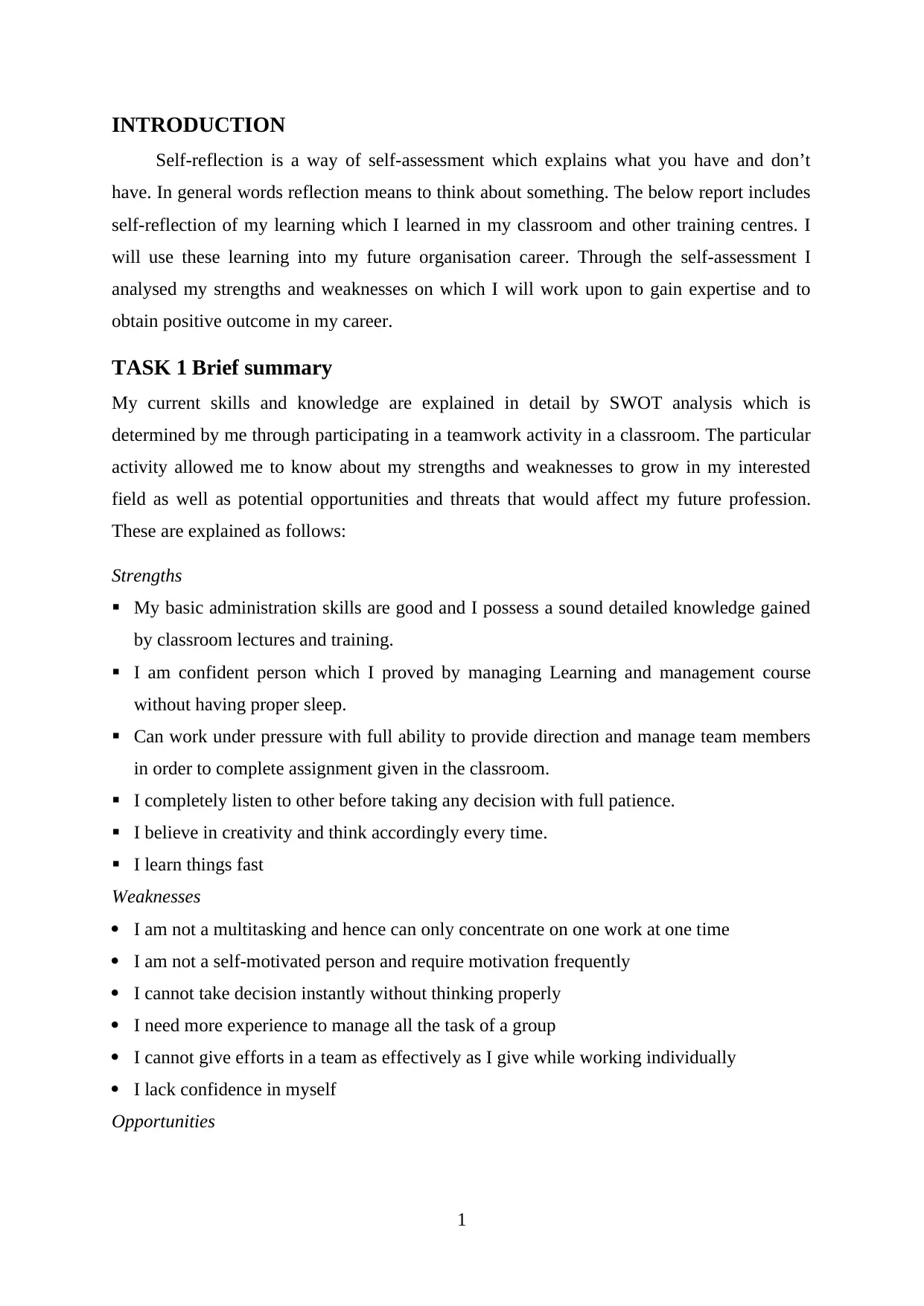
INTRODUCTION
Self-reflection is a way of self-assessment which explains what you have and don’t
have. In general words reflection means to think about something. The below report includes
self-reflection of my learning which I learned in my classroom and other training centres. I
will use these learning into my future organisation career. Through the self-assessment I
analysed my strengths and weaknesses on which I will work upon to gain expertise and to
obtain positive outcome in my career.
TASK 1 Brief summary
My current skills and knowledge are explained in detail by SWOT analysis which is
determined by me through participating in a teamwork activity in a classroom. The particular
activity allowed me to know about my strengths and weaknesses to grow in my interested
field as well as potential opportunities and threats that would affect my future profession.
These are explained as follows:
Strengths
My basic administration skills are good and I possess a sound detailed knowledge gained
by classroom lectures and training.
I am confident person which I proved by managing Learning and management course
without having proper sleep.
Can work under pressure with full ability to provide direction and manage team members
in order to complete assignment given in the classroom.
I completely listen to other before taking any decision with full patience.
I believe in creativity and think accordingly every time.
I learn things fast
Weaknesses
I am not a multitasking and hence can only concentrate on one work at one time
I am not a self-motivated person and require motivation frequently
I cannot take decision instantly without thinking properly
I need more experience to manage all the task of a group
I cannot give efforts in a team as effectively as I give while working individually
I lack confidence in myself
Opportunities
1
Self-reflection is a way of self-assessment which explains what you have and don’t
have. In general words reflection means to think about something. The below report includes
self-reflection of my learning which I learned in my classroom and other training centres. I
will use these learning into my future organisation career. Through the self-assessment I
analysed my strengths and weaknesses on which I will work upon to gain expertise and to
obtain positive outcome in my career.
TASK 1 Brief summary
My current skills and knowledge are explained in detail by SWOT analysis which is
determined by me through participating in a teamwork activity in a classroom. The particular
activity allowed me to know about my strengths and weaknesses to grow in my interested
field as well as potential opportunities and threats that would affect my future profession.
These are explained as follows:
Strengths
My basic administration skills are good and I possess a sound detailed knowledge gained
by classroom lectures and training.
I am confident person which I proved by managing Learning and management course
without having proper sleep.
Can work under pressure with full ability to provide direction and manage team members
in order to complete assignment given in the classroom.
I completely listen to other before taking any decision with full patience.
I believe in creativity and think accordingly every time.
I learn things fast
Weaknesses
I am not a multitasking and hence can only concentrate on one work at one time
I am not a self-motivated person and require motivation frequently
I cannot take decision instantly without thinking properly
I need more experience to manage all the task of a group
I cannot give efforts in a team as effectively as I give while working individually
I lack confidence in myself
Opportunities
1
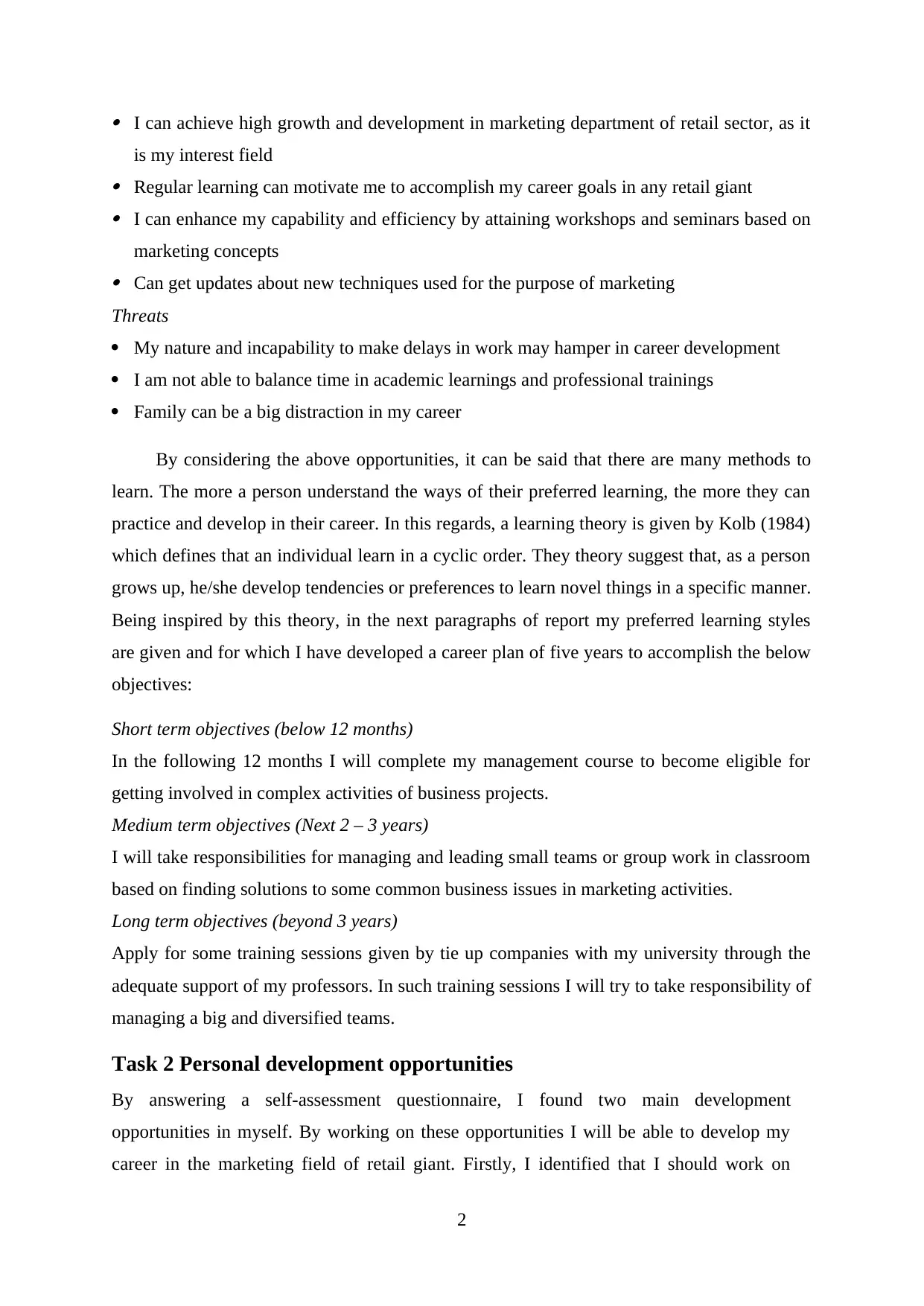
I can achieve high growth and development in marketing department of retail sector, as it
is my interest field Regular learning can motivate me to accomplish my career goals in any retail giant I can enhance my capability and efficiency by attaining workshops and seminars based on
marketing concepts Can get updates about new techniques used for the purpose of marketing
Threats
My nature and incapability to make delays in work may hamper in career development
I am not able to balance time in academic learnings and professional trainings
Family can be a big distraction in my career
By considering the above opportunities, it can be said that there are many methods to
learn. The more a person understand the ways of their preferred learning, the more they can
practice and develop in their career. In this regards, a learning theory is given by Kolb (1984)
which defines that an individual learn in a cyclic order. They theory suggest that, as a person
grows up, he/she develop tendencies or preferences to learn novel things in a specific manner.
Being inspired by this theory, in the next paragraphs of report my preferred learning styles
are given and for which I have developed a career plan of five years to accomplish the below
objectives:
Short term objectives (below 12 months)
In the following 12 months I will complete my management course to become eligible for
getting involved in complex activities of business projects.
Medium term objectives (Next 2 – 3 years)
I will take responsibilities for managing and leading small teams or group work in classroom
based on finding solutions to some common business issues in marketing activities.
Long term objectives (beyond 3 years)
Apply for some training sessions given by tie up companies with my university through the
adequate support of my professors. In such training sessions I will try to take responsibility of
managing a big and diversified teams.
Task 2 Personal development opportunities
By answering a self-assessment questionnaire, I found two main development
opportunities in myself. By working on these opportunities I will be able to develop my
career in the marketing field of retail giant. Firstly, I identified that I should work on
2
is my interest field Regular learning can motivate me to accomplish my career goals in any retail giant I can enhance my capability and efficiency by attaining workshops and seminars based on
marketing concepts Can get updates about new techniques used for the purpose of marketing
Threats
My nature and incapability to make delays in work may hamper in career development
I am not able to balance time in academic learnings and professional trainings
Family can be a big distraction in my career
By considering the above opportunities, it can be said that there are many methods to
learn. The more a person understand the ways of their preferred learning, the more they can
practice and develop in their career. In this regards, a learning theory is given by Kolb (1984)
which defines that an individual learn in a cyclic order. They theory suggest that, as a person
grows up, he/she develop tendencies or preferences to learn novel things in a specific manner.
Being inspired by this theory, in the next paragraphs of report my preferred learning styles
are given and for which I have developed a career plan of five years to accomplish the below
objectives:
Short term objectives (below 12 months)
In the following 12 months I will complete my management course to become eligible for
getting involved in complex activities of business projects.
Medium term objectives (Next 2 – 3 years)
I will take responsibilities for managing and leading small teams or group work in classroom
based on finding solutions to some common business issues in marketing activities.
Long term objectives (beyond 3 years)
Apply for some training sessions given by tie up companies with my university through the
adequate support of my professors. In such training sessions I will try to take responsibility of
managing a big and diversified teams.
Task 2 Personal development opportunities
By answering a self-assessment questionnaire, I found two main development
opportunities in myself. By working on these opportunities I will be able to develop my
career in the marketing field of retail giant. Firstly, I identified that I should work on
2
Secure Best Marks with AI Grader
Need help grading? Try our AI Grader for instant feedback on your assignments.
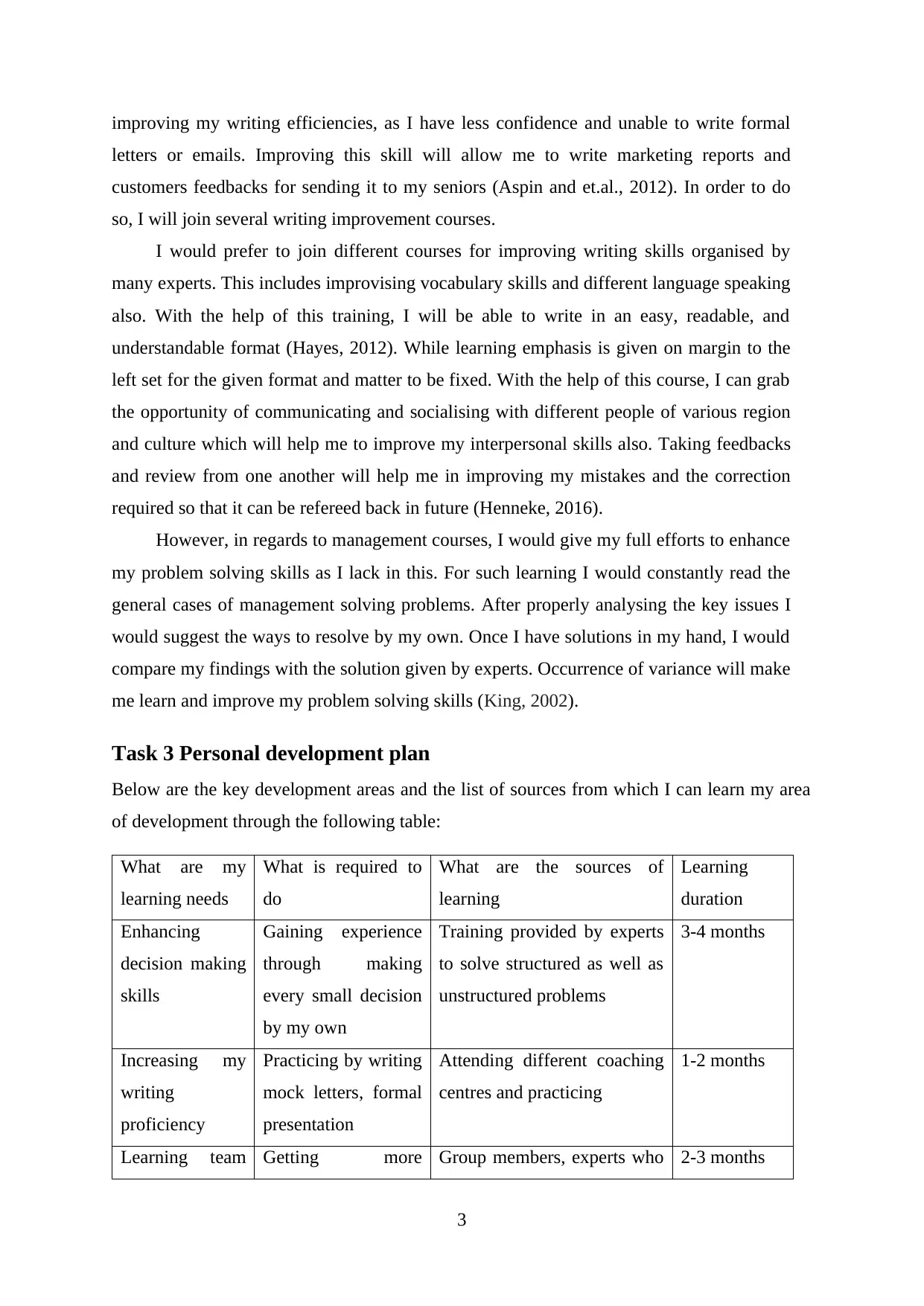
improving my writing efficiencies, as I have less confidence and unable to write formal
letters or emails. Improving this skill will allow me to write marketing reports and
customers feedbacks for sending it to my seniors (Aspin and et.al., 2012). In order to do
so, I will join several writing improvement courses.
I would prefer to join different courses for improving writing skills organised by
many experts. This includes improvising vocabulary skills and different language speaking
also. With the help of this training, I will be able to write in an easy, readable, and
understandable format (Hayes, 2012). While learning emphasis is given on margin to the
left set for the given format and matter to be fixed. With the help of this course, I can grab
the opportunity of communicating and socialising with different people of various region
and culture which will help me to improve my interpersonal skills also. Taking feedbacks
and review from one another will help me in improving my mistakes and the correction
required so that it can be refereed back in future (Henneke, 2016).
However, in regards to management courses, I would give my full efforts to enhance
my problem solving skills as I lack in this. For such learning I would constantly read the
general cases of management solving problems. After properly analysing the key issues I
would suggest the ways to resolve by my own. Once I have solutions in my hand, I would
compare my findings with the solution given by experts. Occurrence of variance will make
me learn and improve my problem solving skills (King, 2002).
Task 3 Personal development plan
Below are the key development areas and the list of sources from which I can learn my area
of development through the following table:
What are my
learning needs
What is required to
do
What are the sources of
learning
Learning
duration
Enhancing
decision making
skills
Gaining experience
through making
every small decision
by my own
Training provided by experts
to solve structured as well as
unstructured problems
3-4 months
Increasing my
writing
proficiency
Practicing by writing
mock letters, formal
presentation
Attending different coaching
centres and practicing
1-2 months
Learning team Getting more Group members, experts who 2-3 months
3
letters or emails. Improving this skill will allow me to write marketing reports and
customers feedbacks for sending it to my seniors (Aspin and et.al., 2012). In order to do
so, I will join several writing improvement courses.
I would prefer to join different courses for improving writing skills organised by
many experts. This includes improvising vocabulary skills and different language speaking
also. With the help of this training, I will be able to write in an easy, readable, and
understandable format (Hayes, 2012). While learning emphasis is given on margin to the
left set for the given format and matter to be fixed. With the help of this course, I can grab
the opportunity of communicating and socialising with different people of various region
and culture which will help me to improve my interpersonal skills also. Taking feedbacks
and review from one another will help me in improving my mistakes and the correction
required so that it can be refereed back in future (Henneke, 2016).
However, in regards to management courses, I would give my full efforts to enhance
my problem solving skills as I lack in this. For such learning I would constantly read the
general cases of management solving problems. After properly analysing the key issues I
would suggest the ways to resolve by my own. Once I have solutions in my hand, I would
compare my findings with the solution given by experts. Occurrence of variance will make
me learn and improve my problem solving skills (King, 2002).
Task 3 Personal development plan
Below are the key development areas and the list of sources from which I can learn my area
of development through the following table:
What are my
learning needs
What is required to
do
What are the sources of
learning
Learning
duration
Enhancing
decision making
skills
Gaining experience
through making
every small decision
by my own
Training provided by experts
to solve structured as well as
unstructured problems
3-4 months
Increasing my
writing
proficiency
Practicing by writing
mock letters, formal
presentation
Attending different coaching
centres and practicing
1-2 months
Learning team Getting more Group members, experts who 2-3 months
3
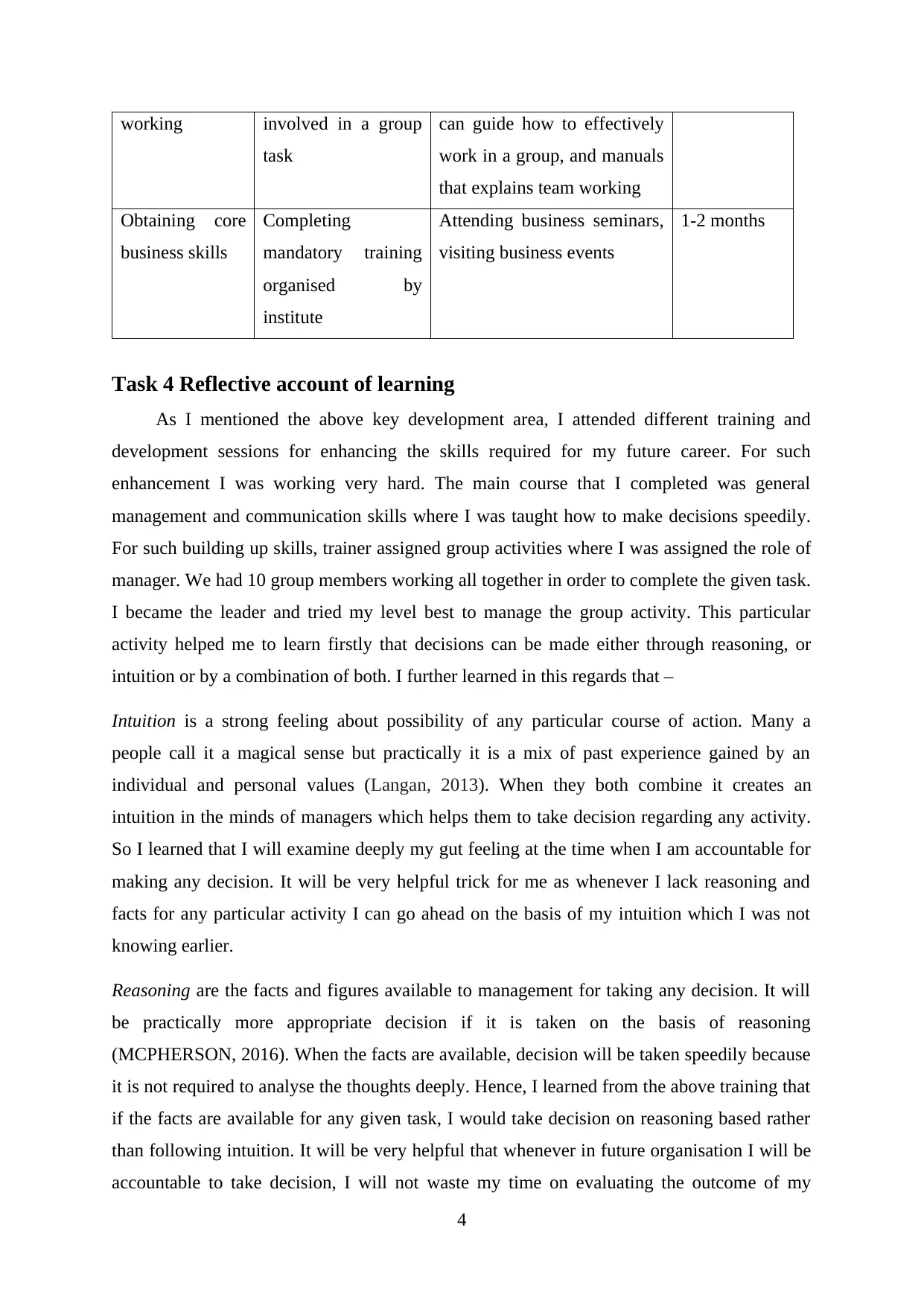
working involved in a group
task
can guide how to effectively
work in a group, and manuals
that explains team working
Obtaining core
business skills
Completing
mandatory training
organised by
institute
Attending business seminars,
visiting business events
1-2 months
Task 4 Reflective account of learning
As I mentioned the above key development area, I attended different training and
development sessions for enhancing the skills required for my future career. For such
enhancement I was working very hard. The main course that I completed was general
management and communication skills where I was taught how to make decisions speedily.
For such building up skills, trainer assigned group activities where I was assigned the role of
manager. We had 10 group members working all together in order to complete the given task.
I became the leader and tried my level best to manage the group activity. This particular
activity helped me to learn firstly that decisions can be made either through reasoning, or
intuition or by a combination of both. I further learned in this regards that –
Intuition is a strong feeling about possibility of any particular course of action. Many a
people call it a magical sense but practically it is a mix of past experience gained by an
individual and personal values (Langan, 2013). When they both combine it creates an
intuition in the minds of managers which helps them to take decision regarding any activity.
So I learned that I will examine deeply my gut feeling at the time when I am accountable for
making any decision. It will be very helpful trick for me as whenever I lack reasoning and
facts for any particular activity I can go ahead on the basis of my intuition which I was not
knowing earlier.
Reasoning are the facts and figures available to management for taking any decision. It will
be practically more appropriate decision if it is taken on the basis of reasoning
(MCPHERSON, 2016). When the facts are available, decision will be taken speedily because
it is not required to analyse the thoughts deeply. Hence, I learned from the above training that
if the facts are available for any given task, I would take decision on reasoning based rather
than following intuition. It will be very helpful that whenever in future organisation I will be
accountable to take decision, I will not waste my time on evaluating the outcome of my
4
task
can guide how to effectively
work in a group, and manuals
that explains team working
Obtaining core
business skills
Completing
mandatory training
organised by
institute
Attending business seminars,
visiting business events
1-2 months
Task 4 Reflective account of learning
As I mentioned the above key development area, I attended different training and
development sessions for enhancing the skills required for my future career. For such
enhancement I was working very hard. The main course that I completed was general
management and communication skills where I was taught how to make decisions speedily.
For such building up skills, trainer assigned group activities where I was assigned the role of
manager. We had 10 group members working all together in order to complete the given task.
I became the leader and tried my level best to manage the group activity. This particular
activity helped me to learn firstly that decisions can be made either through reasoning, or
intuition or by a combination of both. I further learned in this regards that –
Intuition is a strong feeling about possibility of any particular course of action. Many a
people call it a magical sense but practically it is a mix of past experience gained by an
individual and personal values (Langan, 2013). When they both combine it creates an
intuition in the minds of managers which helps them to take decision regarding any activity.
So I learned that I will examine deeply my gut feeling at the time when I am accountable for
making any decision. It will be very helpful trick for me as whenever I lack reasoning and
facts for any particular activity I can go ahead on the basis of my intuition which I was not
knowing earlier.
Reasoning are the facts and figures available to management for taking any decision. It will
be practically more appropriate decision if it is taken on the basis of reasoning
(MCPHERSON, 2016). When the facts are available, decision will be taken speedily because
it is not required to analyse the thoughts deeply. Hence, I learned from the above training that
if the facts are available for any given task, I would take decision on reasoning based rather
than following intuition. It will be very helpful that whenever in future organisation I will be
accountable to take decision, I will not waste my time on evaluating the outcome of my
4
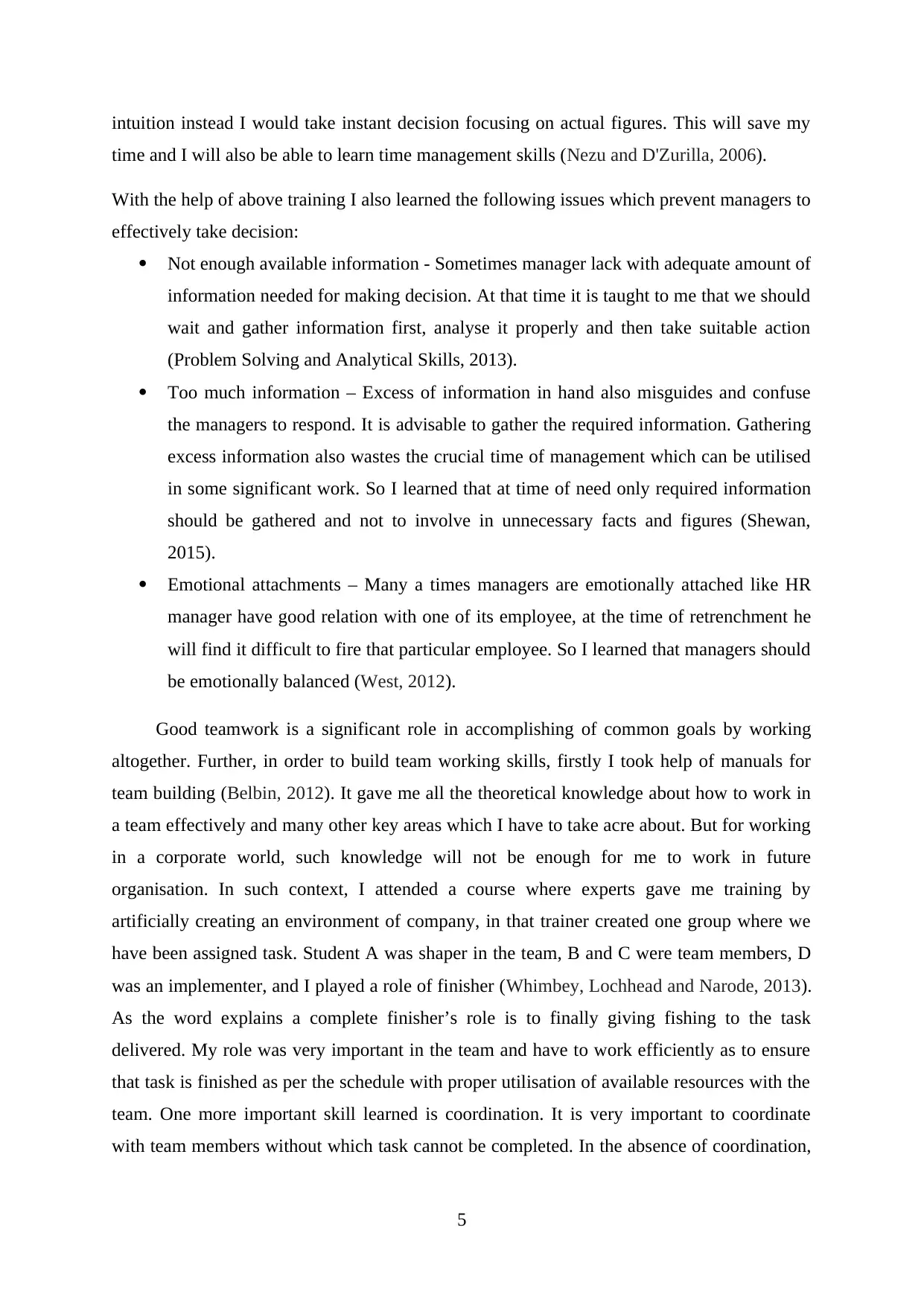
intuition instead I would take instant decision focusing on actual figures. This will save my
time and I will also be able to learn time management skills (Nezu and D'Zurilla, 2006).
With the help of above training I also learned the following issues which prevent managers to
effectively take decision:
Not enough available information - Sometimes manager lack with adequate amount of
information needed for making decision. At that time it is taught to me that we should
wait and gather information first, analyse it properly and then take suitable action
(Problem Solving and Analytical Skills, 2013).
Too much information – Excess of information in hand also misguides and confuse
the managers to respond. It is advisable to gather the required information. Gathering
excess information also wastes the crucial time of management which can be utilised
in some significant work. So I learned that at time of need only required information
should be gathered and not to involve in unnecessary facts and figures (Shewan,
2015).
Emotional attachments – Many a times managers are emotionally attached like HR
manager have good relation with one of its employee, at the time of retrenchment he
will find it difficult to fire that particular employee. So I learned that managers should
be emotionally balanced (West, 2012).
Good teamwork is a significant role in accomplishing of common goals by working
altogether. Further, in order to build team working skills, firstly I took help of manuals for
team building (Belbin, 2012). It gave me all the theoretical knowledge about how to work in
a team effectively and many other key areas which I have to take acre about. But for working
in a corporate world, such knowledge will not be enough for me to work in future
organisation. In such context, I attended a course where experts gave me training by
artificially creating an environment of company, in that trainer created one group where we
have been assigned task. Student A was shaper in the team, B and C were team members, D
was an implementer, and I played a role of finisher (Whimbey, Lochhead and Narode, 2013).
As the word explains a complete finisher’s role is to finally giving fishing to the task
delivered. My role was very important in the team and have to work efficiently as to ensure
that task is finished as per the schedule with proper utilisation of available resources with the
team. One more important skill learned is coordination. It is very important to coordinate
with team members without which task cannot be completed. In the absence of coordination,
5
time and I will also be able to learn time management skills (Nezu and D'Zurilla, 2006).
With the help of above training I also learned the following issues which prevent managers to
effectively take decision:
Not enough available information - Sometimes manager lack with adequate amount of
information needed for making decision. At that time it is taught to me that we should
wait and gather information first, analyse it properly and then take suitable action
(Problem Solving and Analytical Skills, 2013).
Too much information – Excess of information in hand also misguides and confuse
the managers to respond. It is advisable to gather the required information. Gathering
excess information also wastes the crucial time of management which can be utilised
in some significant work. So I learned that at time of need only required information
should be gathered and not to involve in unnecessary facts and figures (Shewan,
2015).
Emotional attachments – Many a times managers are emotionally attached like HR
manager have good relation with one of its employee, at the time of retrenchment he
will find it difficult to fire that particular employee. So I learned that managers should
be emotionally balanced (West, 2012).
Good teamwork is a significant role in accomplishing of common goals by working
altogether. Further, in order to build team working skills, firstly I took help of manuals for
team building (Belbin, 2012). It gave me all the theoretical knowledge about how to work in
a team effectively and many other key areas which I have to take acre about. But for working
in a corporate world, such knowledge will not be enough for me to work in future
organisation. In such context, I attended a course where experts gave me training by
artificially creating an environment of company, in that trainer created one group where we
have been assigned task. Student A was shaper in the team, B and C were team members, D
was an implementer, and I played a role of finisher (Whimbey, Lochhead and Narode, 2013).
As the word explains a complete finisher’s role is to finally giving fishing to the task
delivered. My role was very important in the team and have to work efficiently as to ensure
that task is finished as per the schedule with proper utilisation of available resources with the
team. One more important skill learned is coordination. It is very important to coordinate
with team members without which task cannot be completed. In the absence of coordination,
5
Paraphrase This Document
Need a fresh take? Get an instant paraphrase of this document with our AI Paraphraser
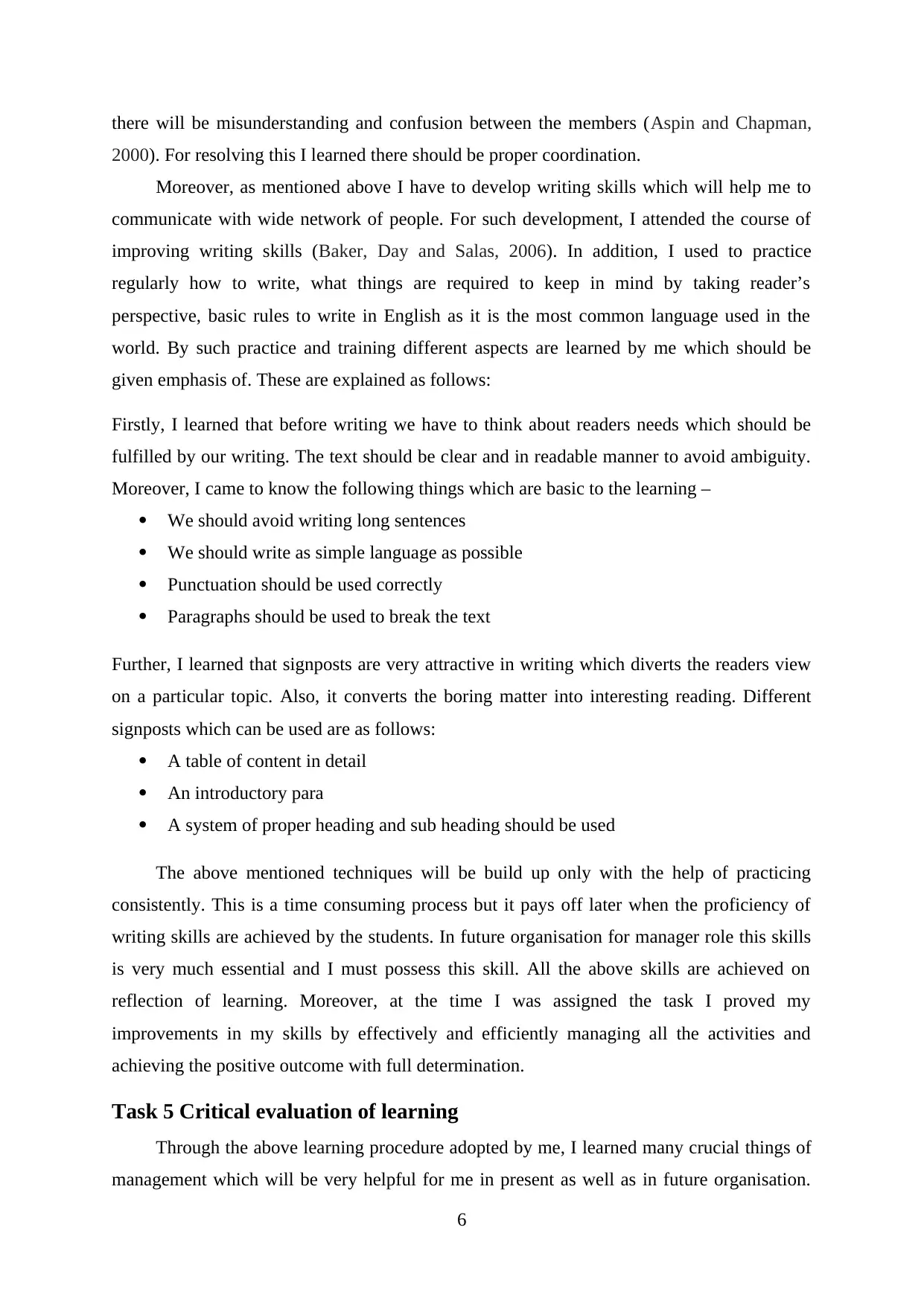
there will be misunderstanding and confusion between the members (Aspin and Chapman,
2000). For resolving this I learned there should be proper coordination.
Moreover, as mentioned above I have to develop writing skills which will help me to
communicate with wide network of people. For such development, I attended the course of
improving writing skills (Baker, Day and Salas, 2006). In addition, I used to practice
regularly how to write, what things are required to keep in mind by taking reader’s
perspective, basic rules to write in English as it is the most common language used in the
world. By such practice and training different aspects are learned by me which should be
given emphasis of. These are explained as follows:
Firstly, I learned that before writing we have to think about readers needs which should be
fulfilled by our writing. The text should be clear and in readable manner to avoid ambiguity.
Moreover, I came to know the following things which are basic to the learning –
We should avoid writing long sentences
We should write as simple language as possible
Punctuation should be used correctly
Paragraphs should be used to break the text
Further, I learned that signposts are very attractive in writing which diverts the readers view
on a particular topic. Also, it converts the boring matter into interesting reading. Different
signposts which can be used are as follows:
A table of content in detail
An introductory para
A system of proper heading and sub heading should be used
The above mentioned techniques will be build up only with the help of practicing
consistently. This is a time consuming process but it pays off later when the proficiency of
writing skills are achieved by the students. In future organisation for manager role this skills
is very much essential and I must possess this skill. All the above skills are achieved on
reflection of learning. Moreover, at the time I was assigned the task I proved my
improvements in my skills by effectively and efficiently managing all the activities and
achieving the positive outcome with full determination.
Task 5 Critical evaluation of learning
Through the above learning procedure adopted by me, I learned many crucial things of
management which will be very helpful for me in present as well as in future organisation.
6
2000). For resolving this I learned there should be proper coordination.
Moreover, as mentioned above I have to develop writing skills which will help me to
communicate with wide network of people. For such development, I attended the course of
improving writing skills (Baker, Day and Salas, 2006). In addition, I used to practice
regularly how to write, what things are required to keep in mind by taking reader’s
perspective, basic rules to write in English as it is the most common language used in the
world. By such practice and training different aspects are learned by me which should be
given emphasis of. These are explained as follows:
Firstly, I learned that before writing we have to think about readers needs which should be
fulfilled by our writing. The text should be clear and in readable manner to avoid ambiguity.
Moreover, I came to know the following things which are basic to the learning –
We should avoid writing long sentences
We should write as simple language as possible
Punctuation should be used correctly
Paragraphs should be used to break the text
Further, I learned that signposts are very attractive in writing which diverts the readers view
on a particular topic. Also, it converts the boring matter into interesting reading. Different
signposts which can be used are as follows:
A table of content in detail
An introductory para
A system of proper heading and sub heading should be used
The above mentioned techniques will be build up only with the help of practicing
consistently. This is a time consuming process but it pays off later when the proficiency of
writing skills are achieved by the students. In future organisation for manager role this skills
is very much essential and I must possess this skill. All the above skills are achieved on
reflection of learning. Moreover, at the time I was assigned the task I proved my
improvements in my skills by effectively and efficiently managing all the activities and
achieving the positive outcome with full determination.
Task 5 Critical evaluation of learning
Through the above learning procedure adopted by me, I learned many crucial things of
management which will be very helpful for me in present as well as in future organisation.
6
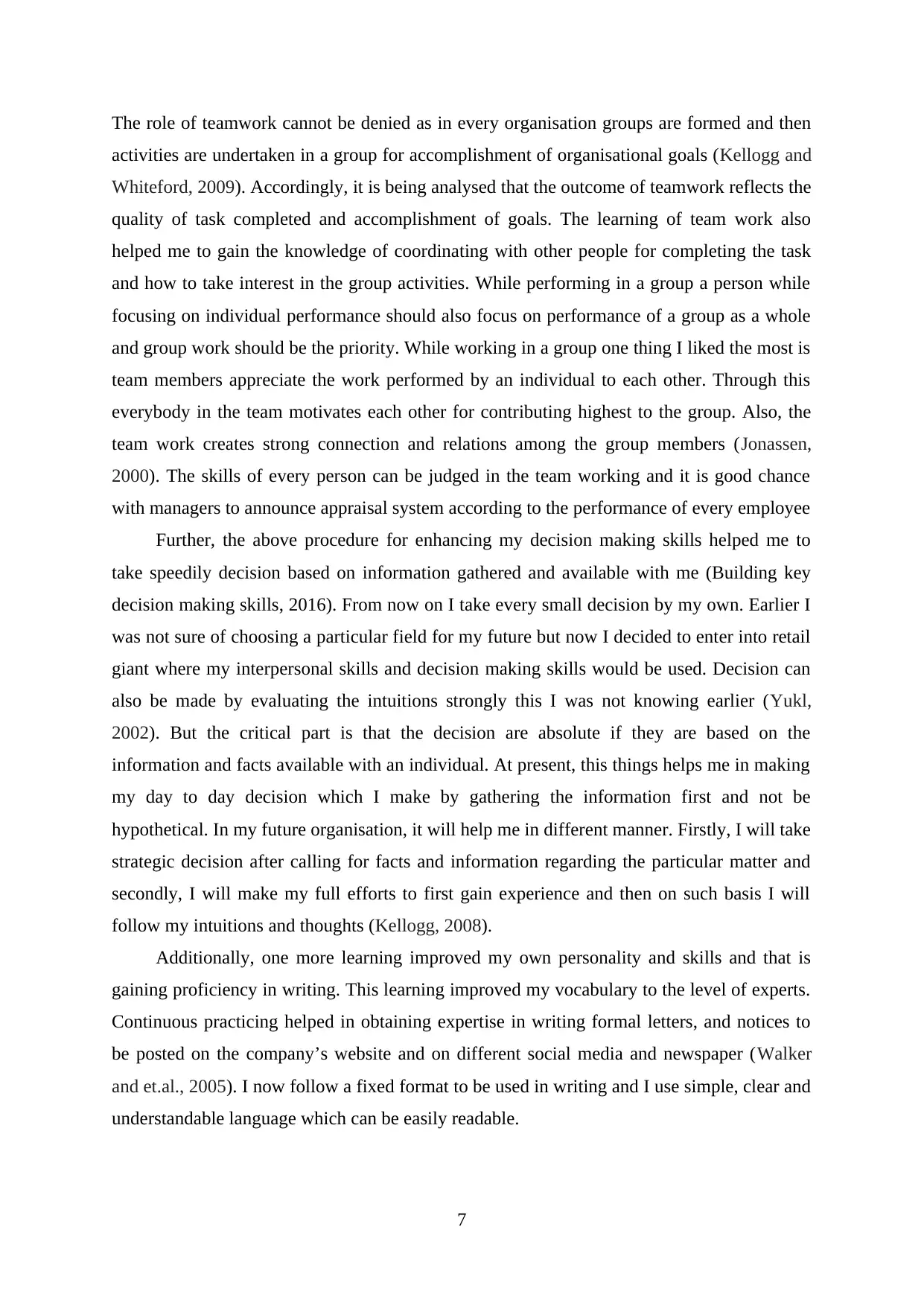
The role of teamwork cannot be denied as in every organisation groups are formed and then
activities are undertaken in a group for accomplishment of organisational goals (Kellogg and
Whiteford, 2009). Accordingly, it is being analysed that the outcome of teamwork reflects the
quality of task completed and accomplishment of goals. The learning of team work also
helped me to gain the knowledge of coordinating with other people for completing the task
and how to take interest in the group activities. While performing in a group a person while
focusing on individual performance should also focus on performance of a group as a whole
and group work should be the priority. While working in a group one thing I liked the most is
team members appreciate the work performed by an individual to each other. Through this
everybody in the team motivates each other for contributing highest to the group. Also, the
team work creates strong connection and relations among the group members (Jonassen,
2000). The skills of every person can be judged in the team working and it is good chance
with managers to announce appraisal system according to the performance of every employee
Further, the above procedure for enhancing my decision making skills helped me to
take speedily decision based on information gathered and available with me (Building key
decision making skills, 2016). From now on I take every small decision by my own. Earlier I
was not sure of choosing a particular field for my future but now I decided to enter into retail
giant where my interpersonal skills and decision making skills would be used. Decision can
also be made by evaluating the intuitions strongly this I was not knowing earlier (Yukl,
2002). But the critical part is that the decision are absolute if they are based on the
information and facts available with an individual. At present, this things helps me in making
my day to day decision which I make by gathering the information first and not be
hypothetical. In my future organisation, it will help me in different manner. Firstly, I will take
strategic decision after calling for facts and information regarding the particular matter and
secondly, I will make my full efforts to first gain experience and then on such basis I will
follow my intuitions and thoughts (Kellogg, 2008).
Additionally, one more learning improved my own personality and skills and that is
gaining proficiency in writing. This learning improved my vocabulary to the level of experts.
Continuous practicing helped in obtaining expertise in writing formal letters, and notices to
be posted on the company’s website and on different social media and newspaper (Walker
and et.al., 2005). I now follow a fixed format to be used in writing and I use simple, clear and
understandable language which can be easily readable.
7
activities are undertaken in a group for accomplishment of organisational goals (Kellogg and
Whiteford, 2009). Accordingly, it is being analysed that the outcome of teamwork reflects the
quality of task completed and accomplishment of goals. The learning of team work also
helped me to gain the knowledge of coordinating with other people for completing the task
and how to take interest in the group activities. While performing in a group a person while
focusing on individual performance should also focus on performance of a group as a whole
and group work should be the priority. While working in a group one thing I liked the most is
team members appreciate the work performed by an individual to each other. Through this
everybody in the team motivates each other for contributing highest to the group. Also, the
team work creates strong connection and relations among the group members (Jonassen,
2000). The skills of every person can be judged in the team working and it is good chance
with managers to announce appraisal system according to the performance of every employee
Further, the above procedure for enhancing my decision making skills helped me to
take speedily decision based on information gathered and available with me (Building key
decision making skills, 2016). From now on I take every small decision by my own. Earlier I
was not sure of choosing a particular field for my future but now I decided to enter into retail
giant where my interpersonal skills and decision making skills would be used. Decision can
also be made by evaluating the intuitions strongly this I was not knowing earlier (Yukl,
2002). But the critical part is that the decision are absolute if they are based on the
information and facts available with an individual. At present, this things helps me in making
my day to day decision which I make by gathering the information first and not be
hypothetical. In my future organisation, it will help me in different manner. Firstly, I will take
strategic decision after calling for facts and information regarding the particular matter and
secondly, I will make my full efforts to first gain experience and then on such basis I will
follow my intuitions and thoughts (Kellogg, 2008).
Additionally, one more learning improved my own personality and skills and that is
gaining proficiency in writing. This learning improved my vocabulary to the level of experts.
Continuous practicing helped in obtaining expertise in writing formal letters, and notices to
be posted on the company’s website and on different social media and newspaper (Walker
and et.al., 2005). I now follow a fixed format to be used in writing and I use simple, clear and
understandable language which can be easily readable.
7
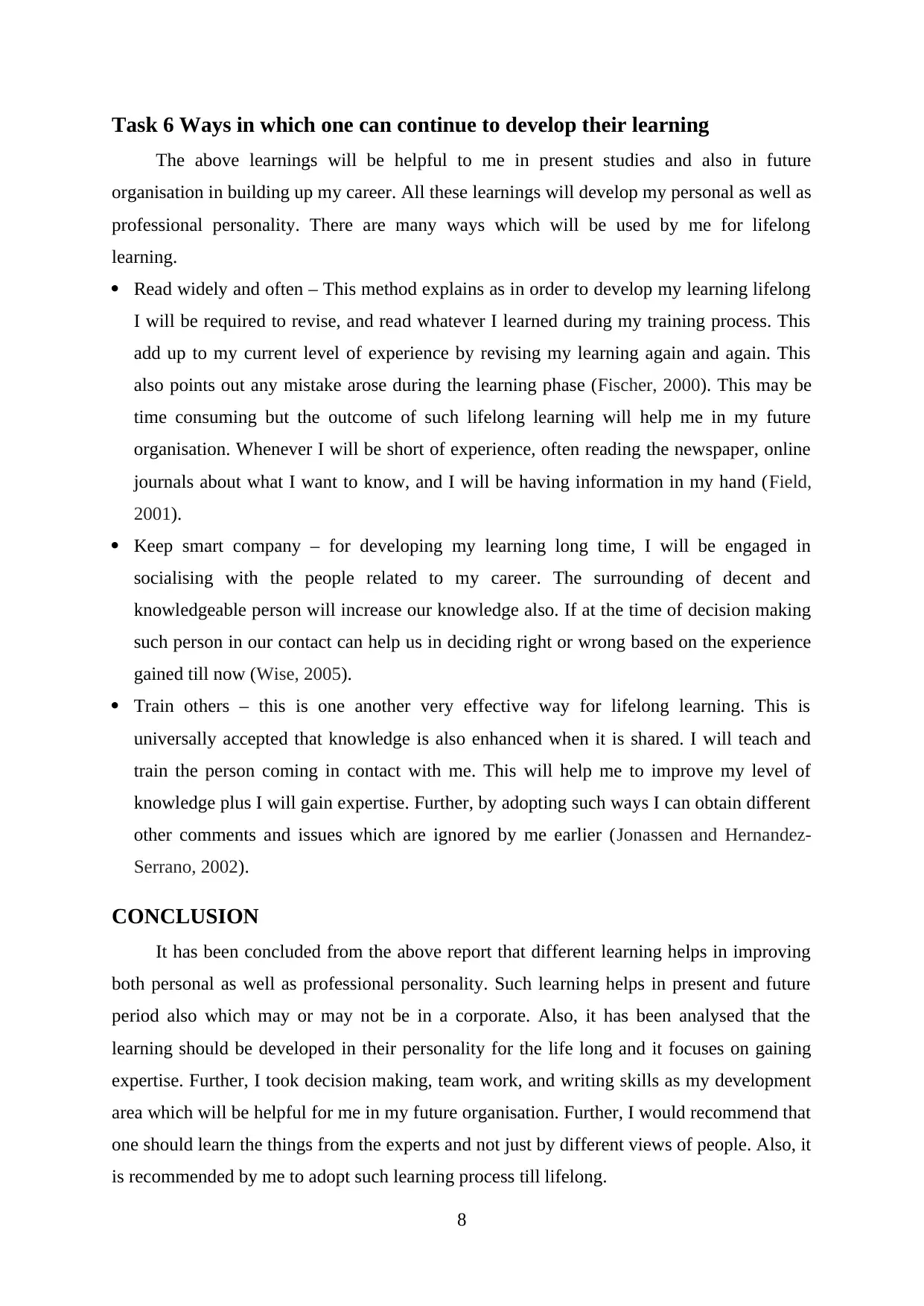
Task 6 Ways in which one can continue to develop their learning
The above learnings will be helpful to me in present studies and also in future
organisation in building up my career. All these learnings will develop my personal as well as
professional personality. There are many ways which will be used by me for lifelong
learning.
Read widely and often – This method explains as in order to develop my learning lifelong
I will be required to revise, and read whatever I learned during my training process. This
add up to my current level of experience by revising my learning again and again. This
also points out any mistake arose during the learning phase (Fischer, 2000). This may be
time consuming but the outcome of such lifelong learning will help me in my future
organisation. Whenever I will be short of experience, often reading the newspaper, online
journals about what I want to know, and I will be having information in my hand (Field,
2001).
Keep smart company – for developing my learning long time, I will be engaged in
socialising with the people related to my career. The surrounding of decent and
knowledgeable person will increase our knowledge also. If at the time of decision making
such person in our contact can help us in deciding right or wrong based on the experience
gained till now (Wise, 2005).
Train others – this is one another very effective way for lifelong learning. This is
universally accepted that knowledge is also enhanced when it is shared. I will teach and
train the person coming in contact with me. This will help me to improve my level of
knowledge plus I will gain expertise. Further, by adopting such ways I can obtain different
other comments and issues which are ignored by me earlier (Jonassen and Hernandez-
Serrano, 2002).
CONCLUSION
It has been concluded from the above report that different learning helps in improving
both personal as well as professional personality. Such learning helps in present and future
period also which may or may not be in a corporate. Also, it has been analysed that the
learning should be developed in their personality for the life long and it focuses on gaining
expertise. Further, I took decision making, team work, and writing skills as my development
area which will be helpful for me in my future organisation. Further, I would recommend that
one should learn the things from the experts and not just by different views of people. Also, it
is recommended by me to adopt such learning process till lifelong.
8
The above learnings will be helpful to me in present studies and also in future
organisation in building up my career. All these learnings will develop my personal as well as
professional personality. There are many ways which will be used by me for lifelong
learning.
Read widely and often – This method explains as in order to develop my learning lifelong
I will be required to revise, and read whatever I learned during my training process. This
add up to my current level of experience by revising my learning again and again. This
also points out any mistake arose during the learning phase (Fischer, 2000). This may be
time consuming but the outcome of such lifelong learning will help me in my future
organisation. Whenever I will be short of experience, often reading the newspaper, online
journals about what I want to know, and I will be having information in my hand (Field,
2001).
Keep smart company – for developing my learning long time, I will be engaged in
socialising with the people related to my career. The surrounding of decent and
knowledgeable person will increase our knowledge also. If at the time of decision making
such person in our contact can help us in deciding right or wrong based on the experience
gained till now (Wise, 2005).
Train others – this is one another very effective way for lifelong learning. This is
universally accepted that knowledge is also enhanced when it is shared. I will teach and
train the person coming in contact with me. This will help me to improve my level of
knowledge plus I will gain expertise. Further, by adopting such ways I can obtain different
other comments and issues which are ignored by me earlier (Jonassen and Hernandez-
Serrano, 2002).
CONCLUSION
It has been concluded from the above report that different learning helps in improving
both personal as well as professional personality. Such learning helps in present and future
period also which may or may not be in a corporate. Also, it has been analysed that the
learning should be developed in their personality for the life long and it focuses on gaining
expertise. Further, I took decision making, team work, and writing skills as my development
area which will be helpful for me in my future organisation. Further, I would recommend that
one should learn the things from the experts and not just by different views of people. Also, it
is recommended by me to adopt such learning process till lifelong.
8
Secure Best Marks with AI Grader
Need help grading? Try our AI Grader for instant feedback on your assignments.

9
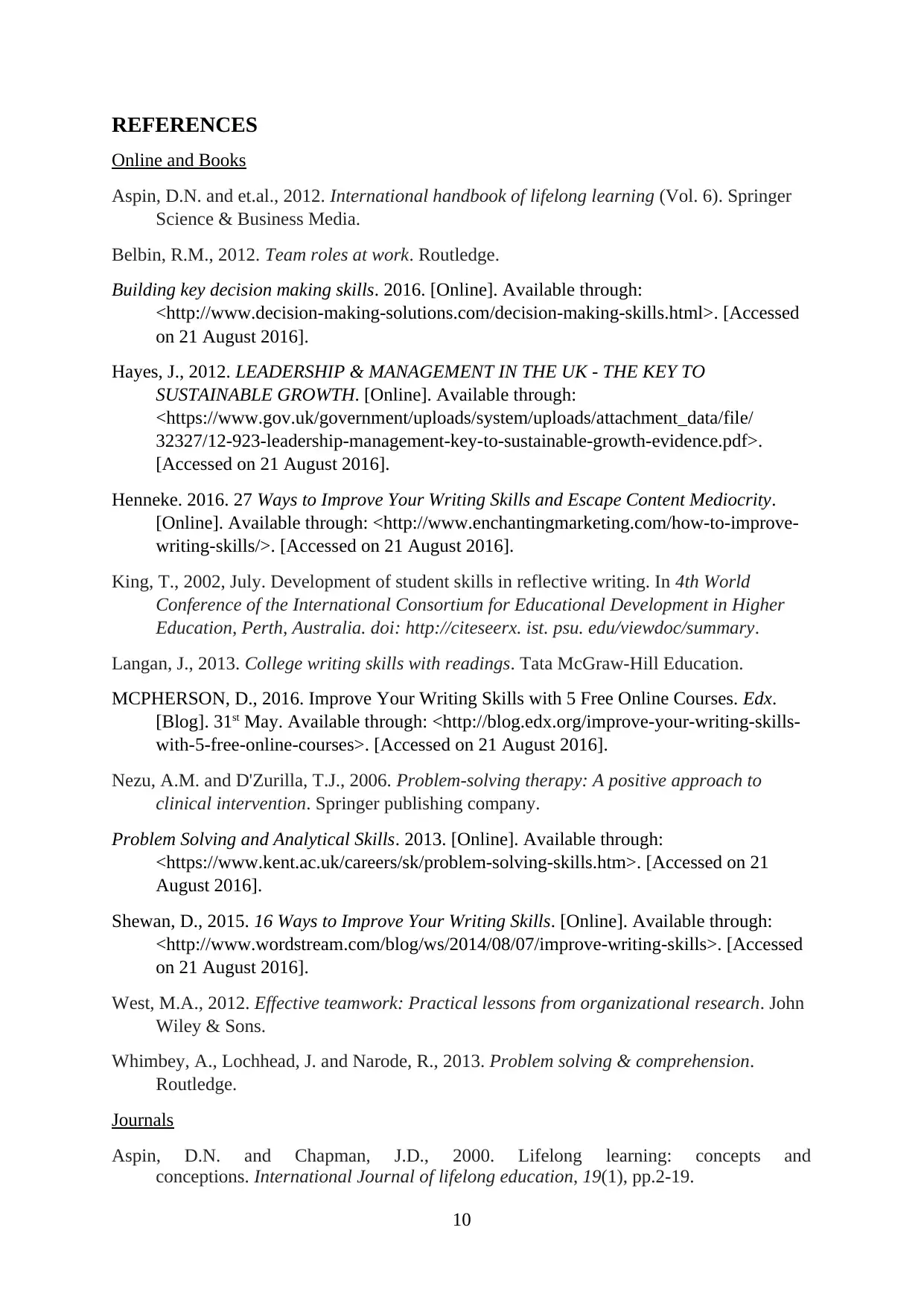
REFERENCES
Online and Books
Aspin, D.N. and et.al., 2012. International handbook of lifelong learning (Vol. 6). Springer
Science & Business Media.
Belbin, R.M., 2012. Team roles at work. Routledge.
Building key decision making skills. 2016. [Online]. Available through:
<http://www.decision-making-solutions.com/decision-making-skills.html>. [Accessed
on 21 August 2016].
Hayes, J., 2012. LEADERSHIP & MANAGEMENT IN THE UK - THE KEY TO
SUSTAINABLE GROWTH. [Online]. Available through:
<https://www.gov.uk/government/uploads/system/uploads/attachment_data/file/
32327/12-923-leadership-management-key-to-sustainable-growth-evidence.pdf>.
[Accessed on 21 August 2016].
Henneke. 2016. 27 Ways to Improve Your Writing Skills and Escape Content Mediocrity.
[Online]. Available through: <http://www.enchantingmarketing.com/how-to-improve-
writing-skills/>. [Accessed on 21 August 2016].
King, T., 2002, July. Development of student skills in reflective writing. In 4th World
Conference of the International Consortium for Educational Development in Higher
Education, Perth, Australia. doi: http://citeseerx. ist. psu. edu/viewdoc/summary.
Langan, J., 2013. College writing skills with readings. Tata McGraw-Hill Education.
MCPHERSON, D., 2016. Improve Your Writing Skills with 5 Free Online Courses. Edx.
[Blog]. 31st May. Available through: <http://blog.edx.org/improve-your-writing-skills-
with-5-free-online-courses>. [Accessed on 21 August 2016].
Nezu, A.M. and D'Zurilla, T.J., 2006. Problem-solving therapy: A positive approach to
clinical intervention. Springer publishing company.
Problem Solving and Analytical Skills. 2013. [Online]. Available through:
<https://www.kent.ac.uk/careers/sk/problem-solving-skills.htm>. [Accessed on 21
August 2016].
Shewan, D., 2015. 16 Ways to Improve Your Writing Skills. [Online]. Available through:
<http://www.wordstream.com/blog/ws/2014/08/07/improve-writing-skills>. [Accessed
on 21 August 2016].
West, M.A., 2012. Effective teamwork: Practical lessons from organizational research. John
Wiley & Sons.
Whimbey, A., Lochhead, J. and Narode, R., 2013. Problem solving & comprehension.
Routledge.
Journals
Aspin, D.N. and Chapman, J.D., 2000. Lifelong learning: concepts and
conceptions. International Journal of lifelong education, 19(1), pp.2-19.
10
Online and Books
Aspin, D.N. and et.al., 2012. International handbook of lifelong learning (Vol. 6). Springer
Science & Business Media.
Belbin, R.M., 2012. Team roles at work. Routledge.
Building key decision making skills. 2016. [Online]. Available through:
<http://www.decision-making-solutions.com/decision-making-skills.html>. [Accessed
on 21 August 2016].
Hayes, J., 2012. LEADERSHIP & MANAGEMENT IN THE UK - THE KEY TO
SUSTAINABLE GROWTH. [Online]. Available through:
<https://www.gov.uk/government/uploads/system/uploads/attachment_data/file/
32327/12-923-leadership-management-key-to-sustainable-growth-evidence.pdf>.
[Accessed on 21 August 2016].
Henneke. 2016. 27 Ways to Improve Your Writing Skills and Escape Content Mediocrity.
[Online]. Available through: <http://www.enchantingmarketing.com/how-to-improve-
writing-skills/>. [Accessed on 21 August 2016].
King, T., 2002, July. Development of student skills in reflective writing. In 4th World
Conference of the International Consortium for Educational Development in Higher
Education, Perth, Australia. doi: http://citeseerx. ist. psu. edu/viewdoc/summary.
Langan, J., 2013. College writing skills with readings. Tata McGraw-Hill Education.
MCPHERSON, D., 2016. Improve Your Writing Skills with 5 Free Online Courses. Edx.
[Blog]. 31st May. Available through: <http://blog.edx.org/improve-your-writing-skills-
with-5-free-online-courses>. [Accessed on 21 August 2016].
Nezu, A.M. and D'Zurilla, T.J., 2006. Problem-solving therapy: A positive approach to
clinical intervention. Springer publishing company.
Problem Solving and Analytical Skills. 2013. [Online]. Available through:
<https://www.kent.ac.uk/careers/sk/problem-solving-skills.htm>. [Accessed on 21
August 2016].
Shewan, D., 2015. 16 Ways to Improve Your Writing Skills. [Online]. Available through:
<http://www.wordstream.com/blog/ws/2014/08/07/improve-writing-skills>. [Accessed
on 21 August 2016].
West, M.A., 2012. Effective teamwork: Practical lessons from organizational research. John
Wiley & Sons.
Whimbey, A., Lochhead, J. and Narode, R., 2013. Problem solving & comprehension.
Routledge.
Journals
Aspin, D.N. and Chapman, J.D., 2000. Lifelong learning: concepts and
conceptions. International Journal of lifelong education, 19(1), pp.2-19.
10
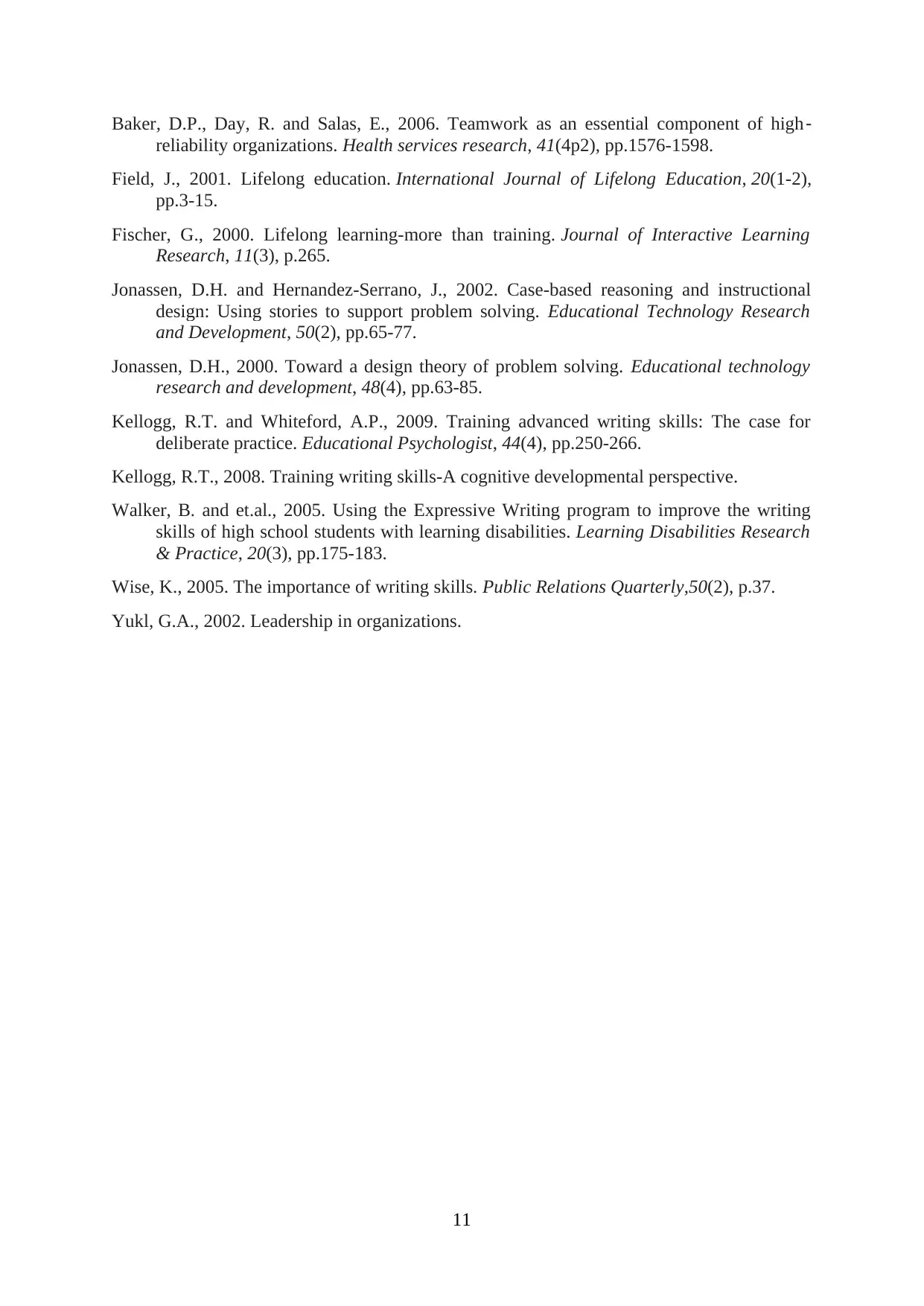
Baker, D.P., Day, R. and Salas, E., 2006. Teamwork as an essential component of high‐
reliability organizations. Health services research, 41(4p2), pp.1576-1598.
Field, J., 2001. Lifelong education. International Journal of Lifelong Education, 20(1-2),
pp.3-15.
Fischer, G., 2000. Lifelong learning-more than training. Journal of Interactive Learning
Research, 11(3), p.265.
Jonassen, D.H. and Hernandez-Serrano, J., 2002. Case-based reasoning and instructional
design: Using stories to support problem solving. Educational Technology Research
and Development, 50(2), pp.65-77.
Jonassen, D.H., 2000. Toward a design theory of problem solving. Educational technology
research and development, 48(4), pp.63-85.
Kellogg, R.T. and Whiteford, A.P., 2009. Training advanced writing skills: The case for
deliberate practice. Educational Psychologist, 44(4), pp.250-266.
Kellogg, R.T., 2008. Training writing skills-A cognitive developmental perspective.
Walker, B. and et.al., 2005. Using the Expressive Writing program to improve the writing
skills of high school students with learning disabilities. Learning Disabilities Research
& Practice, 20(3), pp.175-183.
Wise, K., 2005. The importance of writing skills. Public Relations Quarterly,50(2), p.37.
Yukl, G.A., 2002. Leadership in organizations.
11
reliability organizations. Health services research, 41(4p2), pp.1576-1598.
Field, J., 2001. Lifelong education. International Journal of Lifelong Education, 20(1-2),
pp.3-15.
Fischer, G., 2000. Lifelong learning-more than training. Journal of Interactive Learning
Research, 11(3), p.265.
Jonassen, D.H. and Hernandez-Serrano, J., 2002. Case-based reasoning and instructional
design: Using stories to support problem solving. Educational Technology Research
and Development, 50(2), pp.65-77.
Jonassen, D.H., 2000. Toward a design theory of problem solving. Educational technology
research and development, 48(4), pp.63-85.
Kellogg, R.T. and Whiteford, A.P., 2009. Training advanced writing skills: The case for
deliberate practice. Educational Psychologist, 44(4), pp.250-266.
Kellogg, R.T., 2008. Training writing skills-A cognitive developmental perspective.
Walker, B. and et.al., 2005. Using the Expressive Writing program to improve the writing
skills of high school students with learning disabilities. Learning Disabilities Research
& Practice, 20(3), pp.175-183.
Wise, K., 2005. The importance of writing skills. Public Relations Quarterly,50(2), p.37.
Yukl, G.A., 2002. Leadership in organizations.
11
1 out of 13
Related Documents
Your All-in-One AI-Powered Toolkit for Academic Success.
+13062052269
info@desklib.com
Available 24*7 on WhatsApp / Email
![[object Object]](/_next/static/media/star-bottom.7253800d.svg)
Unlock your academic potential
© 2024 | Zucol Services PVT LTD | All rights reserved.



